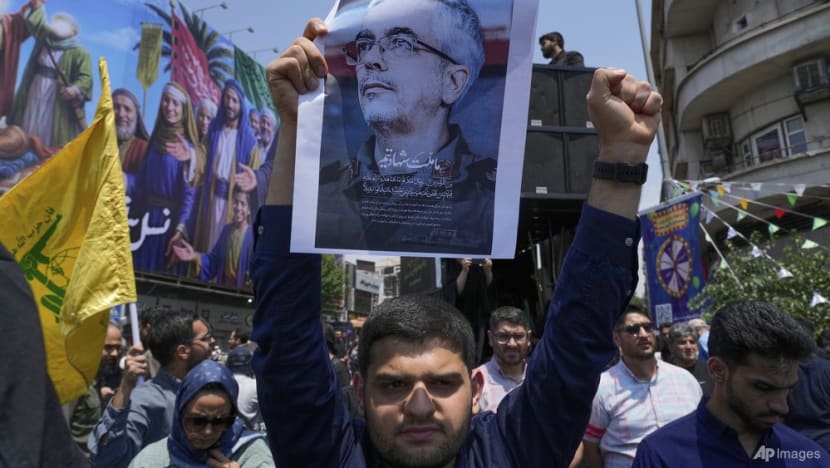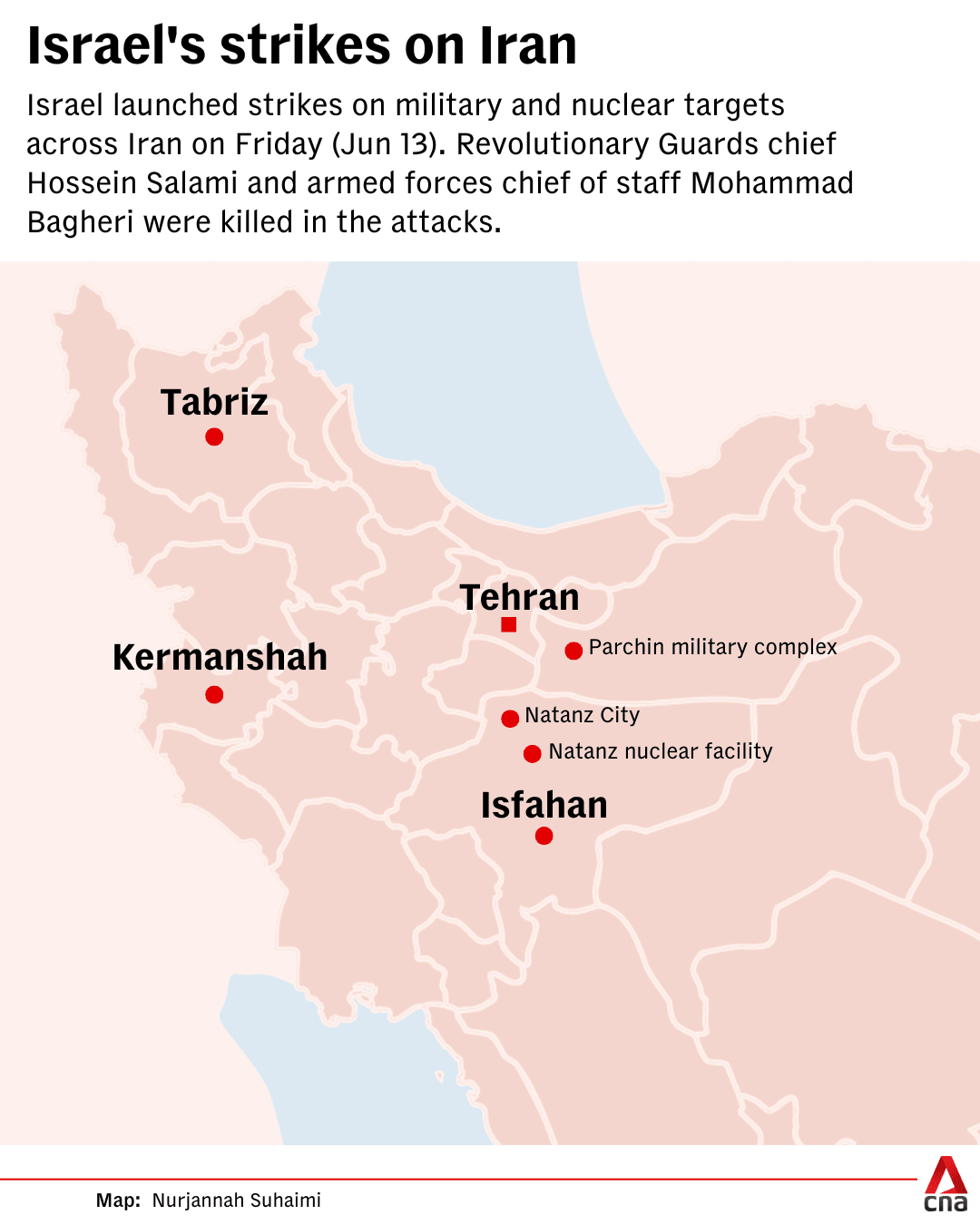Snap Insight: Three responses to watch after Israel’s strikes on Iran
Beyond Iranian retaliation to Israel’s strikes, how the other Middle East countries and the US respond thereafter will determine whether the region faces chaos or a bigger nuclear threat, says NUS Middle East Institute’s Carl Skadian.

An Iranian protester holds up a poster of Chief of General Staff of the Armed Forces Mohammad Bagheri, who was killed in an Israeli strike, in Tehran, Iran, Jun 13, 2025. (AP Photo/Vahid Salemi)

This audio is generated by an AI tool.
SINGAPORE: Israel’s attacks on Iran early Friday (Jun 13) morning should not come as a surprise: With proxy forces Hamas and Hezbollah neutered by events in the past year, Iran’s position in the region has been severely undermined.
When Israel and Iran exchanged strikes in April 2024, the first time both sides had directly targeted each other, Tehran absorbed a body blow: Israel knocked out key installations, including air defence ones, but the Iranian response was ineffective. Most of its missiles and drones were either intercepted or caused minor damage.
Then, when Syrian dictator Bashar Al-Assad was deposed in December 2024, Tehran found itself in an even worse position: The land route through which arms made their way to Lebanon was effectively closed.
Since then, Israel has been champing at the bit, recognising that there might never be a better time to set back Iran’s nuclear programme.
Based on what has been reported, it appears clear that only the United States, which was pursuing a nuclear deal with Iran, kept Israel at bay. President Donald Trump himself apparently waved off a planned strike in May, preferring to pursue diplomacy instead.
The Israelis nevertheless went ahead with their plans on Friday morning, though it is unclear if Washington gave the green light or merely stood aside. With events still developing, there are more questions than answers, but there are three key areas to focus attention on in the coming days and weeks.
IRAN RETALIATION WITH “A FORCEFUL SLAP”
The first is how Iran will react. The scope of the Israeli attack was much wider than anticipated. The Israel Defense Forces did not just go after Iran’s nuclear facilities, it also targeted missile defence installations and laboratories.
Perhaps most significantly, it has reportedly wiped out much of the command structure of the Islamic Republic’s armed forces. Iran has confirmed the death of its military chief, who was the second-highest commander after Supreme Leader Ayatollah Ali Khamenei.
Given this, Tehran can be expected to pull no punches. The question is whether there is any heft left in its punches.
Perhaps the statement by a spokesman of the country’s armed forces is telling: Israel and the US would receive a “forceful slap”, he said – not exactly a term designed to inspire fear of forceful retribution. At the time of writing, it has reportedly launched 100 drones in response, much fewer than Russia has thrown at Ukraine on an almost daily basis.
HOW MIDDLE EAST COUNTRIES WILL RESPOND
The next key element is how the region will respond. Oman, where talks between the US and Iran were to have taken place this weekend, called Israel’s actions reckless.
Others have been predictable in calling out Tel Aviv. A few years ago, such a strike would likely have been greeted with barely restrained glee – behind closed doors, of course – in Arab capitals, particularly in the Gulf.
But over the past few years, many of those same leaders have sought rapprochement with Iran, deeming their economic transformation programmes existential efforts that must plough ahead, and that regional tensions were an unnecessary obstacle.

Make no mistake – there is no love lost between both sides, but they have set aside rivalry in the interest of what they deem the greater good.
This is a setback to the Arab states not just in terms of their economic priorities, but also their geopolitical ones. An Israel acting like a regional hegemon is definitely not in their interests, and it remains to be seen how they will react.
A BLACK EYE FOR DONALD TRUMP
Finally, the attacks are a black eye for Mr Trump and the US.
Mr Trump can now add the ashes of a nuclear agreement with Iran to the litany of his “art of the deal” failures: The “Riviera of the Middle East” in Gaza, an end to the Ukraine war on “day one”, among others.
Perhaps much worse, his admirable aversion to allowing the US to be sucked into a foreign war will now be tested. Whether or not America had any part to play in the Iran strikes, it will inevitably be blamed, and will definitely come into the crosshairs.
If, as is likely, it helps Israel thwart the inevitable counterstrikes from Iran, it will make for a bigger target. Yet, if it does not, a sense of panic will take hold from Taiwan to the Gulf, to Europe.
At the end of the day, while Israel’s strikes appear to have been largely successful, they will bring the world back to square one. There are more than even odds that a chastised Iran will decide that only a nuclear deterrent will keep its enemy at bay, that negotiating with the West is futile, and thus decide that redoubling its efforts to get one is the only way forward.
Carl Skadian, a former journalist and editor for 30 years, is Deputy Director at the Middle East Institute, NUS.













